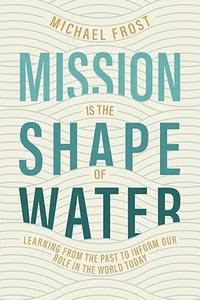 Mission is the Shape of Water
Mission is the Shape of Water
Michael Frost
100 Movements
Reviewed by Rev. Andrew Esnouf
Michael Frost has been a leading Australian voice on the theology and practice of mission in contemporary Western society for several decades and has authored numerous books on these topics. Despite this long list of publications, Mission is the Shape of Water displays a unique approach amongst his corpus of work. Frost’s recent books such as Surprise the World and Keep Christianity Weird have focussed on ways individual Christians can participate in God’s mission through everyday habits and individual flair. ‘Mission is the Shape of Water’ is distinct from these books in that it takes a wider approach, drawing upon Christian history to encourage and equip contemporary Christians in their missional endeavours.
Frost unpacks the title’s opaque imagery in the prologue. Firstly, water’s fluid nature means that it always takes the shape of whatever contains it. In a water bottle it takes the shape of a water bottle, in a bucket it takes the form of a bucket. Like water, Frost suggests, mission’s shape at a particular time and place is always determined by its context. Secondly, taking inspiration from the 2019-2020 pro-democracy protesters in Hong Kong use of the phrase “Be water!” to describe their agile and mobile protest tactics, which could at times combine into an unstoppable force. Coordinated protesters – just like water – are able to move swiftly in some contexts, to pool together into a large immovable contingent and then effortlessly disperse in some contexts, and to move forcefully together as a single force in other contexts. Mission is like water in that it is always contextually attuned to the immediate situation, and is best when a coordinated and responsive movement.
The core of the book are the ten chapters, each describing a different “shape” that water has taken throughout the history of the church, and offering some thoughts on how this shape may look in our current world. These shapes are: God slaying, peacemaking, flame bearing, spirit seeking, wordsmithing, freedom fighting, unshackling, contextualising, remissioning and unearthing. Each of these shapes arose in different contexts and functioned in different ways, and Frost presents them not as an essentialised list of permissible or essential ways to be missional, but as a smorgasbord of approaches, some of which are in tension with each other – sometimes uncomfortably. For instance, in “Spirit Seeking” shape, Frost commends the early modern Moravian missionaries for, among other things, “overlooking seemingly intractable social issues” such as polygamy and slavery in order to call people to salvation. This is in tension with the ‘Freedom Fighting’ shape of mission, in which Christians make resisting such intractable social issues as slavery and other brutalities the core of their missional endeavours. Frost is not contradictory in this, but rather is explicit that differing situations call for diverse approaches to mission.
There are further shortcomings of this book one should be aware of. Firstly, whilst this book includes many historical anecdotes, it should not be mistaken for a work of historical scholarship. Secondly, there is very little articulation of a theology or motivation for Christians or churches to be missional. Finally, there is only sparse advice for readers on how to discern the needs of their current context, and how to shape missional faithfully and effectively in their context. If the reader is seeking edification on any of these three topics, they are best to look elsewhere.
Ultimately, this book isn't perfect, and it isn’t a one-stop-shop for grounding the reader in all aspects of missional thinking and practice. And it does not claim to be. It is, however, an accessible and enjoyable jaunt through Christian history in the search for historical practices of mission that inspire and expand the imagination of the contemporary church.
Andrew Esnouf is Parish Minister (Youth) at St A's Merri-Bek in the Diocese of Melbourne
